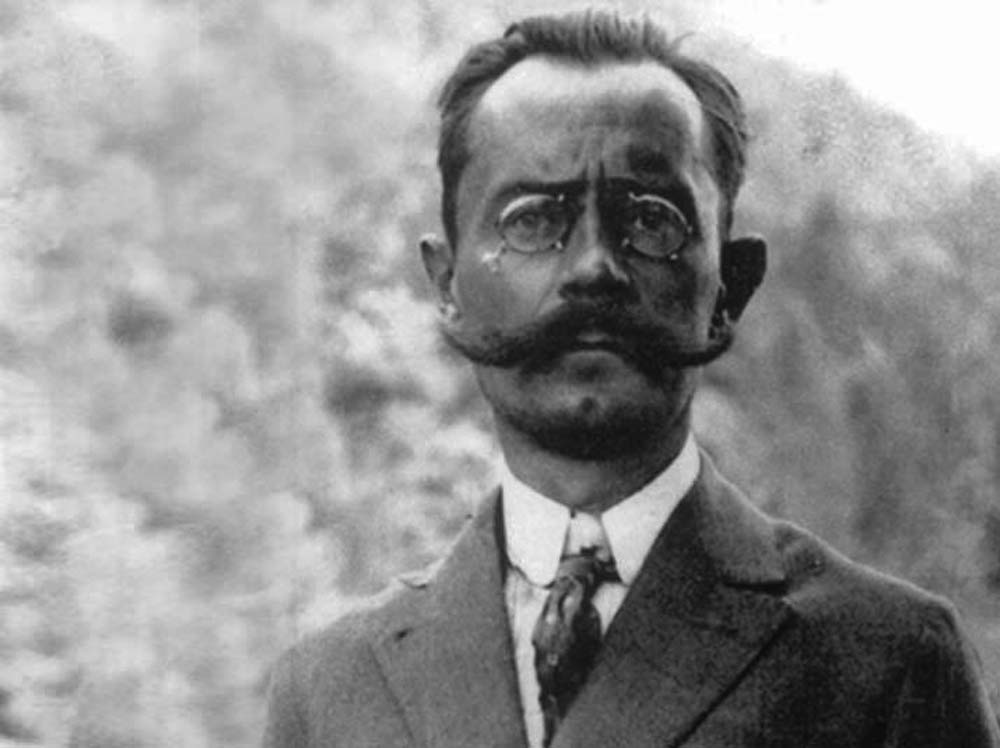 Ο αντικομφορμιστής Ladislav Klíma (1878-1928) - Wikipedia
Ο αντικομφορμιστής Ladislav Klíma (1878-1928) - Wikipedia
_________________________Το γκροτέσκο μυθιστόρημα του Klima, που λάτρεψαν πολλοί στη Δύση και "γέννησε" μία ταινία και μία προκλητική Όπερα
 THE SUFFERINGS OF PRINCE STERNENHOCH
THE SUFFERINGS OF PRINCE STERNENHOCHΤΑ ΠΑΘΗ ΤΟΥ ΠΡΙΓΚΙΠΑ ΣΤΕΡΝΕΝΧΟΧ
Το μόνο ολοκληρωμένο λογοτεχνικό έργο του Klima που το επεξεργαζόταν για δημοσίευση κατά τη διάρκεια της ζωής του και μπορεί να θεωρηθεί ως η συμπύκνωση της φιλοσοφίας του. Το βιβλίο καταγράφει τη βαθμιαία πορεία προς την τρέλα του πρίγκιπα Στέρνενχοχ, πρώτου ανάμεσα στους αριστοκράτες και ευνοούμενου του Κάιζερ. Έχοντας μετατραπεί στα χέρια της πεθαμένης συζύγου του Χέλγκα , βασίλισσας της Κόλασης , "στο κατώτερο είδος των σκουληκιών" , φτάνει τελικά σε μια ολοκληρωτική κατάσταση ευδαιμονίας και σωτηρίας
Ο Klima χρησιμοποιεί σκοτεινό χιούμορ για να εξερευνήσει την παράδοξη φύση της καθαρής πνευματικότητας σε σκηνές όπου κυριαρχούν το κωμικό γκροτέσκο και το άσεμνο. Ο τόμος αυτός περιλαμβάνει επίσης το περιβόητο δοκίμιό του συγγραφέα "Η αυτοβιογραφία μου".
Αν και το έργο του Klima έχει μεταφραστεί σε πολλές ευρωπαϊκές γλώσσες, αυτό είναι το πρώτο του βιβλίο που εμφανίζεται στα αγγλικά.
*******************************
Η ταινία του Jan Nemec "In the Flames of Royal Love" (1991) βασίστηκε στο μυθιστόρημα και παίζεται συχνά σε διάφορες ταινιοθήκες του κόσμου .

*********************************
Τι είπαν για το βιβλίο:
The non-conformist work of Ladislav Klíma has
almost always shocked, has often incited scandal, but has hardly ever
left us indifferent.
One need not accept his view of the world to experience it and
enjoy it in all of its ambiguity, just as one does the stage.
|
— Václav Havel
|
Sternenhoch’s instability is excellently
demonstrated in his inability to hold one topic for longer than a
couple of sentences, his consistent pauses in the
middle of utterance. It’s graphorrhea before we even knew
graphorrhea existed, and its retention is critical to our understanding
of Sternenhoch’s madness.
|
— Amy Riddell, Bookmunch
|
Sternenhoch's antics are by turns depraved and dark, and hugely comical ... Klima's vast talent is more than capable of
handling the task of chronicling Sternenhoch's descent into madness.
|
— Damian Kelleher, Neon
|
What I do want to acknowledge before I conclude is just how readable, how relentlessly entertaining, I found all this to be.
|
The grotesque and the sublime, the extravagant
and the playful, run through this novel breathlessly written by a
philosopher who wanted to recover his health.
|
— Le Monde
|
As a story of one man's madness, this work is up there with Dostoevsky and Kafka, though with a bitter sense of humor and
absurdist, almost maniacal outlook on life.
|
It is a classic darkly comic and obscenely funny piece of writing, — not for everyone
but a wild excursion indeed. True black humor.
|
— edgylit
|
The tone of the book is serious, but not
without humour and irony. The context is hilarious. The author gave the
work the subtitle: A Grotesque. The structure, the building of
this work and its theme, where the ego battles with evil and logic,
refers
to the literary tradition of Notes from the Underground by Dostoevsky and Gogol's Diary of a Madman.
|
— peekaboo
|
Ladislav Klima's The Sufferings of Prince Sternenhoch: A Grotesque Tale of Horror
delivers on its title.
It has everything; a decadent noble of questionable intelligence
and sanity; a twisted, depraved, satanic shrew; not so graphic
lewdness; dungeons, murder, madness... It is frankly, at times,
difficult to stomach; and I have read The 120 Days of Sodom —
more than once.
|
The Sufferings of Prince Sternenhoch may transmit the author's
moral nihilism and Nietzschean will to power as well as any treatise. It
is a hilarious, provocative, graphic — and at times
spectacularly vile — gothic novel, conspicuously rooted in the Decadent
milieu that spawned it, but painted in colors more characteristic of the
Expressionist and Surrealist movements regnant when it
was finally published two decades later. ... Klíma's entry since then
into the Czech canon, to say nothing of his importance to artists as
varied as Bohumil Hrabal, Jiri Kolar and the Plastic People
of the Universe, more than warrants the scrupulous care that Bulkin and
Twisted Spoon have dedicated to this welcome translation.
|
— Slavic and East European Journal
|
Klíma's tale reads like a book that Edgar Allan Poe might have written if he'd read Nietzsche, but there are
also moments of reverie that are pure Czech ... Klíma's rambunctious mix of high and low style and holy and profane
content has been stamped indelibly on the Czech literary tradition.
|
— Washington City Paper
|
There's much of the whip in all this, a great fascination with all things perverse ... Much scabrous wit and the
hallucinatory nature of events leave the reader uncertain about taking anything seriously. Appended is the author's
autobiography, in which he turns out to be as pathological as any of his characters, a genuine transgressive in the
manner of de Sade.
|
— Publishers Weekly
|
A dark, diverting entertainment, certainly out of the ordinary ... [Klíma] was a decidedly odd bloke, a real character.
But he was not a stupid man, and he could write. This volume is apparently the first book of Klíma's to appear in
English. Certainly he is an author deserving wider recognition in the English-speaking world.
|
— The Complete Review
|
Given the power of Carleton Bulkin's excellent translation, I can only
hope that Twisted Spoon or some other publisher sees fit to soon
translate more of Klíma's works —
fiction or philosophy ... The Sufferings of Prince Sternenhoch runs with gale-force intensity and speed.
|
— The Education Digest
|
********************************
Παγιδευμένος σε έναν καταχρηστικό γάμο, ένας πλούσιος γερμανός πρίγκιπας αναζητά απεγνωσμένα μια διέξοδο. Αλλά αυτό που φαίνεται να είναι ο δρόμος της σωτηρίας μετατρέπεται σύντομα σε αυτοκινητόδρομο προς την κόλαση.
Η παγκόσμια γλώσσα της μουσικής συναντά τη διεθνή γλώσσα της εσπεράντο σε αυτή την πρώτη όπερα από τον Ivan Acher.
See: Ivan Acher, Sternenhoch
2018
(
Plot:
)
Sternenhoch: Delightful depravity in Prague/Απολαυστική ανηθικότητα στην Πράγα
Itʼs a rare stage interpretation of a literary work that thoroughly captures the essence and spirit of the source material. In the case of the National Theaterʼs new production Sternenhoch, the opera not only brings to life Ladislav Klímaʼs 1928 Expressionist novel with an electric jolt, but goes it one better.
Sternenhoch
© Patrik Borecký
Though almost universally reviled at the time, Sternenhoch has left an enduring imprint in a part of the world that also gave birth to Kafka and struggled mightily to survive 40 years of Nazi and communist occupation. And the work is not entirely without merit. It has a mordant wit and in its better moments draws heavily on deep thinkers like Schopenhauer and Nietzsche in considering concepts like will, subjectivism and spirituality.

Sternenhoch
© Patrik Borecký
Bulgarian-Ukrainian tenor Sergey Kostov shows remarkable facility in the title role, rising to the demands of often-delirious vocals ranging from romantic bombast to a cringing falsetto. Czech soprano Vanda Šípová does heroic work as Helga, dragged around the stage, chained by her wrists and ankles and sexually abused while singing plaintive, affecting lines about love and loss. For all that, the most intriguing figure onstage may be Tereza Marečková as Kuhmist, outfitted as a female satyr who taunts and torments the other characters with a violin or viola in hand.

Sternenhoch
© Patrik Borecký

Sternenhoch
© Patrik Borecký
ΔΕΙΤΕ ΤΟ ΕΡΓΟ (Αγγλικοί υπότιτλοι)
(Προσοχή! Περιέχει τολμηρές σκηνές που μπορούν να σοκάρουν)


Δεν υπάρχουν σχόλια:
Δημοσίευση σχολίου